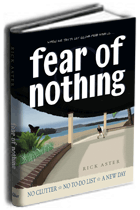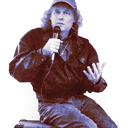I have reached the end of my month without shopping. It did not go exactly the way I planned, but that was the point — to find out what would happen.
As I learned almost right away, it probably is not realistic to plan to avoid shopping entirely for any specific length of time. Things go wrong in unpredictable ways and at unpredictable times. In many cases making a purchase is the right solution to a problem. When a friend had a cold, buying cough drops was the kind thing for me to do. When my running shoes were falling apart, a new pair of shoes was the cautious solution. Replacing glitchy charging cables made it possible to keep working productively.
Then there is the matter of food. Fresh food has a limited shelf life, so I could not eat well except by buying food during the month. My social life depends on restaurant meals more than I realized, and I ate six meals in restaurants over the course of the month.
Almost every time I went into a store or market to buy something, I bought more things than the bare minimum I needed. I was being practical, I told myself. As long as I was already there, it would take only another minute to buy another item. Looking back, I am glad I did so. In particular, the coconut milk and blueberries I bought in the supermarket while I was there to get cough drops made the limited fare in my kitchen easier to take for the second half of the month.
I think I could almost get by shopping in this manner — waiting until events forced me to shop, then buying all the things that it made sense to buy in the shop I went to. I would reduce my shopping time by more than half, and I would surely end up spending less.
One lesson from the month is that I have been overestimating how much I can use. This is especially obvious when it comes to food and clothing. In a month of no shopping, I threw away only maybe three worn-out clothing items. At this rate, it could take me ten years to run out of clothing. Except — when I went to pick up my race number for the marathon that I ran yesterday, the marathon gave me two articles of clothing. When I think about it, nearly every race I enter gives me at least a shirt. As with any clothing, the race shirts don’t last forever, but from the races of the last ten years, I still have five T-shirts. In addition to the T-shirts, I have one sweatshirt, one pullover, one polo shirt, and two long-sleeved exercise shirts, each from a different race. I will surely run more races. I could go a long time before I would need to buy another shirt. I will eventually need to replace a clothing item other than a shirt, but that might not happen this year. Sweatshirts are a case in point. Seven months ago as fall approached, I thought I should buy one more sweatshirt. I didn’t because I didn’t find one I liked. I didn’t wear out any of my sweatshirts over the winter, and I have one I did not wear even once. I thought I needed more, but I had plenty.
It is the same with food. In a month of no grocery shopping, I imagined I might eat most of the food I had in the house. I might feel like I was running out of food at the end of the month. Clearly, I got the proportions wrong. I did in fact clear out most of the refrigerator, but the freezer is still nearly full, and I still have more than my own weight in grains, packaged food, oil, and baking mixes. I must not eat as much as I imagine I do when I am buying food. And then people give me food. This is food left over from a business meeting, a party, or something else. I like free food, and people think of me when they have food to give away. I must not forget the food at parties and meetings I actually attend. I ate at least the equivalent of a normal supper at one evening business meeting this month. Yesterday as I finished running a marathon, the running festival gave me two bananas — and they would have given me more food if I had been willing to take it. The food people give me is not enough that I could live on it, but it is easily enough that I have to take it into account when preparing my food budget.
I had thought I would start buying local produce at the middle of the month, but that need did not come up until this last weekend. It took weeks to tire of the bitter dandelion greens that I can pick from my own lawn to the point where I wanted to go get something else, which turned out to be lettuce, cabbage, and radish greens from local farms.
I had imagined I would bake more of my own food, and I did some of that, but I did not get to the point of baking a loaf of bread. There is still bread in the freezer. I do not eat bread as fast as I had imagined either. Of course, as more fresh produce is in season over the next seven months, I will eat even less bread and packaged food. Over the course of the month, I wrote five grocery items on my shopping list, but now that I see how much food there is in the house, I am not about to rush out tomorrow to get more. It can surely wait another week. I will continue to minimize my grocery purchases while I wait for the Pennsylvania peach season to arrive at the end of July.
Of course, I saved money by not shopping. My total purchases for the month were around $200. My total payments for the month, including all required tax payments, were around $850. That does not represent a repeatable pattern, but it does suggest that my living expenses and business expenses don’t have to be as high as they are.
Saving time was more important than the money I saved. I didn’t realize how much attention I had been giving to commercial email until I was deleting every “limited-time offer” unopened. I wasn’t stopping in stores just because I happened to be driving by. I stopped thinking of shopping as a way to escape the frustrations or doldrums of whatever I was working on that particular day. There are, I now think, more constructive forms of emotional escape. For example, nearly all of us could stand to get more exercise, and I am no exception. Indeed, the time I saved by not shopping created the four hours it took for me to go on one extra training run of 19 miles as I prepared for the marathon at the end of the month. That extra training distance might account for a marathon time that was 10 percent faster than the year before.
I found I enjoyed shopping more when I did not do so much of it — just as economic theory suggests. I doubt I need to completely avoid shopping to get this effect. If I could reduce my shopping to two hours a month, I might enjoy every minute of it. If I got by with just a few minutes of shopping this month, and knowing now that I do not need to shop regularly for clothing, perhaps two hours would be more than enough shopping time for a normal month.
Not shopping did not always save time. I got out needle and thread twice to repair a pillow case that was starting to tear at the edges. It was no use. The fabric was wearing out, and the pillow case split all the way across before the month was over. Despite my repairs, I have to throw it away. The short life of this pillow case shows that it was made from a flawed design, transferring too much stress to the fabric that covers the top of the pillow. I’ll want to go back to a traditional design when I replace the pillow case.
When I couldn’t make a purchase during my no-shopping month, I added the item to my shopping list for May, but I did this hardly at all. Besides the five grocery items I mentioned, I wrote one household supply, one book, one record, one hardware item, and one charity on my list. The other items I thought to purchase, I decided I could do without — and I have already forgotten what they were.
Much of shopping, I think, is a mistake. We buy things on a whim thinking these things will improve our lives somehow. Then, collectively, half of the stuff we buy goes unused. Applying a greater degree of skepticism and validation to purchasing decisions — including tactics as simple as waiting a few weeks — could save half of our shopping time.
I said I wanted to go without shopping, and I went a whole month without going into a store, or even a web store, with the idea of buying something new for myself. It was not as hard as it sounded. My life was simpler and more peaceful as a result. I was more productive. My conclusion is that I should not spend half as much time shopping as I was doing before.



No comments:
Post a Comment